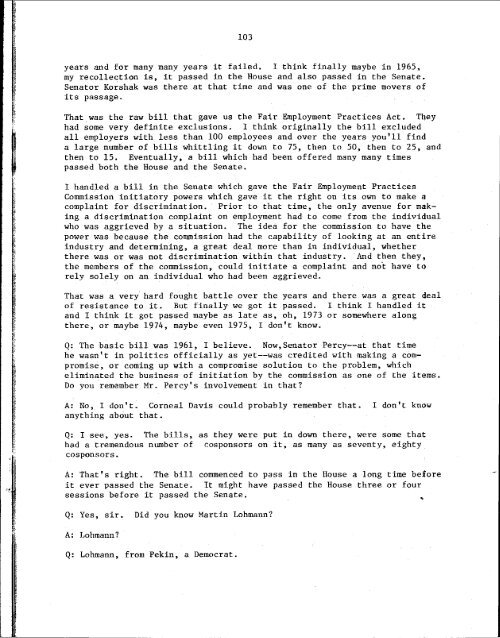Cecil A. Partee Memoir - University of Illinois Springfield
Cecil A. Partee Memoir - University of Illinois Springfield
Cecil A. Partee Memoir - University of Illinois Springfield
Create successful ePaper yourself
Turn your PDF publications into a flip-book with our unique Google optimized e-Paper software.
years and for many many years it failed. I think finally maybe in 1965,<br />
my recollection is, it passed in the House and also passed in the Senate.<br />
Senator Korshak was there at that time and was one <strong>of</strong> the prime movers <strong>of</strong><br />
its passage.<br />
That was the raw bill that gave us the Fair Fmployment Practices Act. They<br />
had some very definite exclusions. I think originally the bill excluded<br />
all employers with less than LOO employees and over the years you'll find<br />
a large number <strong>of</strong> bills whittling it down to 75, then to 50, then to 25, and<br />
then to 15. Eventually, a bill which had been <strong>of</strong>fered many many times<br />
passed both the House and the Senate.<br />
I handled a bill in the Senate which gave the Fair Employment Practices<br />
Commission initiatory powers which gave it the right an its own to make a<br />
complaint for disctirninatian. Prior to that: time, the only avenue for making<br />
a discrimination complaint on employment had to come from the individual<br />
who was aggrieved by a situation. The idea for the commission to have the<br />
power was because the commission had the capability <strong>of</strong> looking at an entire<br />
industry and determining, a great deal more than in individual, whether<br />
there was or was not discrimination within that industry. And then they,<br />
the members <strong>of</strong> the commission, could initiate a complaint and not have to<br />
rely solely on an individual who had been aggrieved.<br />
That was a very hard fought battle over the years and there was a great deal<br />
<strong>of</strong> resistance to it. But finally we got it passed. I think T handled it<br />
and I think it got passed maybe as late as, oh, 1973 or somewhere along<br />
there, or maybe 1974, maybe even 1975, I don't know.<br />
Q: The basic bill was 1961, 1 believe. Now,Senator Percy--at that time<br />
he wasnk in politics <strong>of</strong>ficially as yet--was credited with making a compromise,<br />
or coming up with a compromise solution to the problem, which<br />
eliminated the business <strong>of</strong> initiation by the commission as one <strong>of</strong> the items.<br />
Do you remember Mr. Percy's involvement in that?<br />
A: No, I don't. Corneal Davis could probably remember that. I don't know<br />
anything about that.<br />
Q: I see, yes. The bills, as they were put in down there, were some that<br />
had a tremendous number <strong>of</strong> cosponsors on it, as many as seventy, eighty<br />
cosponsors.<br />
A: That's right. The bill commenced to pass in the House a long time before<br />
it ever passed the Senate. It might have passed the Bause three or four<br />
sessions before it passed the Senate.<br />
a<br />
Q: Yes, sir. Did you know Martin Lohmann?<br />
A: Lohmann?<br />
Q: Lohmann, from Pekin, a Democrat.
















